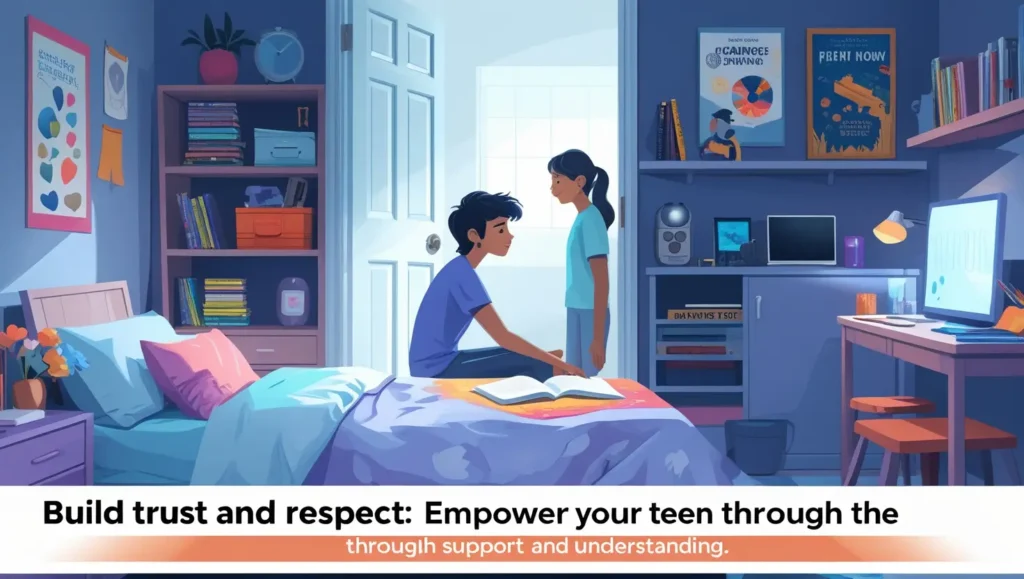Parenting teenagers comes with unique challenges and opportunities. Did you know that teens who report having a strong relationship with their parents are 20% less likely to experience depression and 35% more likely to excel academically? Adolescence is a transformative period, and the bond between parents and their teens can profoundly influence their growth, well-being, and future relationships.
According to Dr. Lisa Damour, clinical psychologist and author of Under Pressure, “Teenagers want to feel like their parents are a safe harbor—not just someone to discipline them, but someone they can trust.” Despite their quest for independence, teens deeply value emotional support and connection from their parents.
This article provides actionable tips to help you nurture a strong, healthy relationship with your teen. Whether through better communication, quality time, or fostering trust, these strategies will empower you to navigate the teenage years with confidence and empathy.
1. Understand the Teenage Mind
Adolescence is a phase of profound transformation. Understanding the changes your teen is going through is key to fostering a deeper connection.
- Developmental Changes: Teens experience significant hormonal and cognitive shifts that affect their decision-making and emotional responses. These changes can sometimes lead to mood swings or impulsive behaviors. By recognizing these patterns, parents can respond with patience and empathy. Learn more about the teenage brain from the American Academy of Child and Adolescent Psychiatry.
- Need for Independence: As teens strive for autonomy, they may resist parental control or seek more privacy. This is a normal part of growing up, and parents should respect their teen’s need for independence while maintaining open lines of communication. Setting clear boundaries and encouraging decision-making can help teens feel trusted and supported. Explore tips on building trust with teens from ReachOut Australia.

2. Communicate Effectively
Effective communication is the foundation of a strong parent-teen relationship. By fostering an environment where your teen feels heard and valued, you can build trust and reduce misunderstandings.
- Active Listening: For example, if your teen shares a concern about a challenging school project, resist the urge to immediately suggest solutions. Instead, respond with something like, “That sounds stressful. How are you thinking of handling it?” This shows that you trust their problem-solving skills while being supportive.
- Empathy and Validation: Acknowledge your teen’s feelings, even if you don’t agree with them. Saying, “I understand why you feel that way,” shows you value their perspective and builds a safe space for open dialogue. Discover how empathy strengthens communication on the Parent & Teen Connection.
- Non-Confrontational Approach: If your teen misses curfew, instead of reacting with anger, try saying, “I was worried when you were late. Can we talk about what happened?” This invites collaboration rather than conflict, promoting a respectful dialogue.
By prioritizing empathy, active listening, and a non-confrontational tone, you can nurture a relationship where your teen feels respected and understood.
People also Read: 10 Key Differences Between Healthy and Unhealthy Relationships.

3. Spend Quality Time Together
Spending quality time with your teen strengthens your bond and creates opportunities for meaningful conversations. It’s not just about quantity but the quality of time spent that matters.
- Shared Activities: Engage in activities your teen enjoys, whether it’s playing sports, gaming, cooking, or watching their favorite shows together. Shared interests foster a sense of connection and mutual enjoyment. For more ideas, check out Youth First’s guide to building relationships.
- Family Meals: Eating meals together is a simple yet powerful way to build family connections. Research shows that teens who regularly dine with their families are more likely to perform well academically and exhibit fewer behavioral problems. Read more about the benefits of family meals on Raising Children Network.
- Casual Moments: Use everyday interactions, like car rides, grocery shopping, or household chores, to connect informally. These moments often provide opportunities for lighthearted conversations and deeper insights into your teen’s life.
Quality time is about being present and attentive, showing your teen that they are a priority in your life.
10 Effective Ways to Communicate with Your Teen Without Arguments.

4. Build Trust and Respect
Trust and respect are the cornerstones of a strong parent-teen relationship. By modeling these behaviors, you create a foundation for mutual understanding and connection.
- Consistency and Reliability: Imagine you promise to attend your teen’s recital but get caught up with work. Apologizing sincerely and explaining how you’ll prioritize next time demonstrates accountability, which teens value deeply. Explore tips on building trust with teens from All Pro Dad.
- Respect Privacy: Teens need personal space to grow and develop their identity. Respecting their privacy while maintaining appropriate boundaries shows you trust them to make responsible choices. Learn more about respecting your teen’s autonomy on Relationships WA.
- Honest Communication: Be open and clear about your expectations, values, and decisions. Avoid being authoritarian; instead, engage your teen in discussions about family rules or important topics, which helps them feel valued and respected.
By fostering trust and respect, you empower your teen to approach you with confidence, knowing they are seen and heard.
How to Build Trust in Relationships (Without Sounding Like a Self-Help Book).

5. Encourage Independence Within Boundaries
As teens strive for independence, parents play a crucial role in providing a safe framework that balances freedom with accountability. Encouraging autonomy within set boundaries helps teens build confidence while ensuring their safety.
- Guided Decision-Making: For instance, if your teen wants to join a sports team that requires travel, involve them in weighing the pros and cons, such as balancing schoolwork and commitments. This teaches them to approach decisions thoughtfully.
- Set Clear Rules: Collaboratively establish boundaries that reflect mutual respect and understanding. Teens are more likely to follow rules they helped create. Ensure these rules are clear, consistent, and age-appropriate. Check out tips on setting boundaries at Sue Atkins Parenting Coach.
- Teach Responsibility: Assigning specific responsibilities, like budgeting for a family outing or planning their weekly schedule, helps teens practice skills they’ll need as adults while reinforcing trust in their abilities.
Balancing independence with guidance helps teens develop decision-making skills and a sense of accountability, laying the groundwork for a successful transition into adulthood.
Stressed Out? You’re Not Alone! A Guide to Stress Management Techniques for Students.

6. Show Unconditional Love
Unconditional love is the foundation of a healthy parent-teen relationship. During adolescence, when emotions and conflicts can run high, demonstrating unwavering support reassures your teen that they are valued and accepted.
- Express Affection: For example, leave a sticky note on their mirror with a simple, “You’ve got this!” on the day of a big test. These small gestures remind your teen of your unwavering support in their day-to-day challenges. Learn more about expressing affection effectively from Gen Mindful.
- Celebrate Achievements: Acknowledge their efforts and accomplishments, no matter how small. Celebrating milestones, such as completing a project or helping a friend, reinforces their self-esteem and motivation.
- Be Patient During Conflicts: Disagreements are inevitable, but staying calm and composed during these moments helps de-escalate tensions. Revisit discussions when emotions have cooled to ensure productive conversations.
Unconditional love fosters a sense of security and belonging, encouraging teens to approach their parents with trust and confidence.
10 Ways to Manage Everyday Stress (for Teens).

7. Address Emotional Challenges
Adolescence is a time of emotional turbulence, and parents play a vital role in helping teens navigate these challenges. By providing support and guidance, you can help your teen build resilience and emotional well-being.
- Recognize Mood Swings: Moodiness is a natural part of teenage development due to hormonal and neurological changes. While occasional mood swings are normal, watch for persistent signs of emotional distress that may indicate a deeper issue. Learn more about recognizing and managing teen emotions from Raising Children Network.
- Support Mental Health: Encourage open conversations about feelings and stressors. If your teen shows signs of anxiety, depression, or other mental health concerns, seek professional help promptly. Explore resources for supporting teen mental health on Headspace.
- Teach Coping Skills: Help your teen develop healthy strategies to manage stress, such as mindfulness, deep breathing, or physical activity. Teaching them to handle challenges constructively can empower them to face difficulties with confidence.
By addressing emotional challenges proactively, you can provide your teen with the tools they need to thrive both emotionally and socially.
Unlocking Inner Strength: Inspirational Quotes and Practical Insights for Resilience.

8. Lead by Example
Teens are keen observers of their parents’ actions and behaviors. By modeling positive habits and attitudes, you can inspire your teen to develop healthy relationship skills and emotional intelligence.
- Model Healthy Behaviors: Demonstrate effective communication, emotional regulation, and problem-solving skills in your daily interactions. For instance, handling stress calmly or resolving conflicts respectfully teaches your teen valuable life skills. Read more about modeling positive behaviors from the Parent and Teen Connection.
- Show Respect in Relationships: Treat others with kindness, empathy, and fairness, whether it’s family members, friends, or colleagues. Teens are more likely to emulate the respectful behaviors they observe in their parents.
- Practice Self-Care: Prioritize your own well-being, as it sets an example for your teen to value their physical and mental health. Self-care also helps you remain patient and engaged in your parenting role.
By leading with integrity and compassion, you can inspire your teen to adopt positive habits and build meaningful relationships throughout their life.
Conclusion
Building and maintaining a strong, healthy relationship with your teen is a journey that requires patience, understanding, and intentional effort. By focusing on effective communication, spending quality time, fostering trust and respect, and addressing emotional challenges, parents can create a supportive environment where teens feel valued and loved.
Remember, it’s normal for the teenage years to come with challenges, but these moments also offer opportunities for growth—for both you and your teen. By leading with empathy and showing unconditional love, you not only strengthen your bond but also equip your teen with the tools to build meaningful relationships in their own lives.
Parenting a teenager is as much about self-growth as it is about guiding your child. Celebrate small wins—whether it’s an honest conversation or a shared laugh. Remember, even when the journey feels challenging, every effort you make today lays the foundation for a lasting bond tomorrow.











